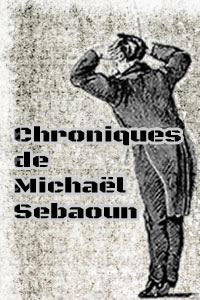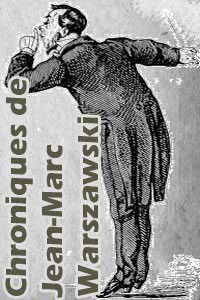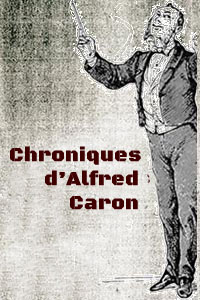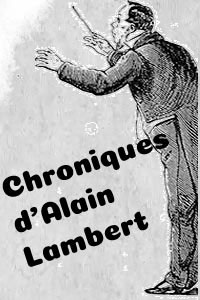
Actualités musicales
dimanche 17 novembre 2013
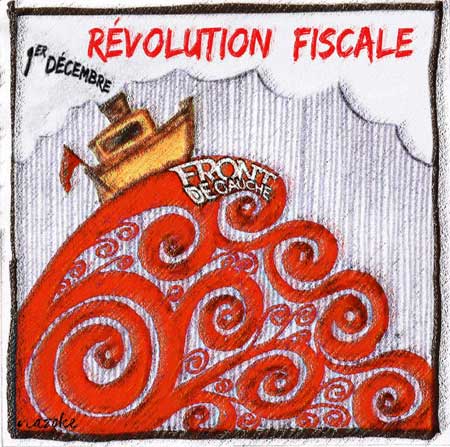
The Musical Worlds of Polish Jews, 1920-1960: Identity, Politics and Culture
Call for Papers
Arizona State University, November 17-18, 2013
The Center for Jewish Studies and the School of Music at Arizona State University in collaboration with The OREL Foundation announce an international conference devoted to the musical worlds of Polish Jews from 1920 to 1960. The conference will be held at Arizona State University in November 2013.
For the past three years, the Center for Jewish Studies at ASU has focused on the recovery, study and performance of music composed by Jews whose music was suppressed by the Third Reich. Previously we have featured music of German-speaking Jewish composers; this conference will focus on Polish-Jewish composers. The goal of the conference is to shed light on the richness of Polish-Jewish music from WWI to the decades after WWII and its relation to the complex problem of identity formation.
At the end of the First World War, almost three million Jews from the Russian, German, and Austrian Empires found themselves in the newly re-created state of Poland. In the subsequent two decades, this Jewish community, the largest in Europe, faced the challenge of becoming "Polish Jews." Out of this challenge was born a rich and vibrant culture that deserves more recognition by music lovers and close analysis by scholars. Even under German occupation, the cultural and musical creativity of Polish Jews did not cease but became an important element of camp and ghetto lives. For years after the war, whether in exile or at home, the art of Polish Jews continued to reflect the complex relationship with Polish-ness and Polish culture.
Papers on the following themes are solicited:
1. Poland and Its Jews: Between Empires and Nation-States.
2. Polish-Jewish Music: Within and Between Modernism and Nationalism
3. Polish Jews/Jewish Poles: Culture and the Quest for Identity
4. Jewish Music under Nazi Occupation
5. Polish-Jewish Composers in Exile
6. Music Outside the Concert Hall: Cabaret, Theater, and Film
This will be a two-day event featuring both scholarly presentations and performances. We cordially invite submissions that deal with the work of particular composers or related topics. Scholarly papers should not be longer than 20 minutes and lecture recitals should not exceed more than 30 minutes. Abstracts (500 words) along with a short biography of the presenter should be submitted by March 30, 2013 to:
Professor Anna Holian
Interim Director, Center for Jewish Studies
P.O. Box 874302
Arizona State University
Tempe, AZ 85287-4302
Anna.Holian at asu.edu
Organizing Committee:
Ann Cichopek-Gajraj, Assistant Professor of History, ASU ; Robert Elias, President, OREL Foundation, Los Angeles ; Sabine Feisst, Professor of Music History and Literature, ASU ; Anna Holian, Associate Professor of History, ASU ; Hava Tirosh-Samuelson, Irving and Miriam Lowe Chair of Modern Judaism and Director of Jewish Studies, ASU ; Bret Werb, Musicologist and Curator of Music Collections, United States Holocaust Museum and Memorial, Washington DC.
Hélène Tysman ballade Chopin
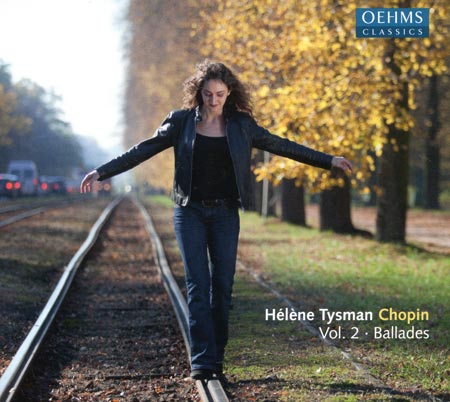
Hélène Tysman, Chopin (v. 2), Ballades. OEHMS Classics 2013 (2 v. OC 894).
Enregistré les 18-20 septembre 2012, à La Chaux-de-Fonds en Suisse.
Après avoir enregistré la sonate no 2 opus 35 et les 24 préludes opus 28 de Chopin en 2010 (Oehms Classics), participé à un bel enregistrement de musique de chambre pour vents de Robert Schumann avec les solistes de l'Orchestre de Paris en 2012 (Indesens !), Hélène Tysmann nous offre un troisième album, il est double, les quatre ballades dans l'ordre chronologique, mais aussi des mazurkas, une barcarolle et une polonaise, de nouveau chez Oehms Classics. La jaquette portant un « volume 2 », on peut supposer qu'une suite est en projet.
Après des études cosmopolites, du Conservatoire de région de Saint-Maur au National supérieur de Paris, de Cologne à Hambourg en passant par Vienne, après avoir ramassé sa brassée de prix, comme au 16e Concours international Chopin de Varsovie, Hélène Tysman semble avoir bien engagé sa carrière de concertiste.
Lire un entretien d'Hélène Tysman avec Jean-Marc Warszawski
Ballade no 4 en fa mineur (extrait)
Plage 4 du second cédé
Cédé 1.
1. Ballade no 1 en sol mineur, opus 23
2. Mazurka en sol mineur, opus 24, no 1
3. Mazurka en do majeur, opus 24, no 2
4. Mazurka en la bémol majeur, opus 24, no 3
5. Mazurka en si bémol mineur, opus 24, no 4
6. Ballade no 2 en fa majeur, opus 38
7. Barcarolle en fa dièse majeur, opus 60
Cédé 2.
1. Nocturne en si majeur, opus 9, no 3
2. Ballade no 3 en la bémol majeur, opus 47
3. Polonaise-Fantaisie en la bémol majeur, opus 61
4. Ballade no 4 en fa mineur, opus 52
Dans la malle du Poilu, des œuvres pour piano et violon avec Célimène Daudet et Amanda Favier
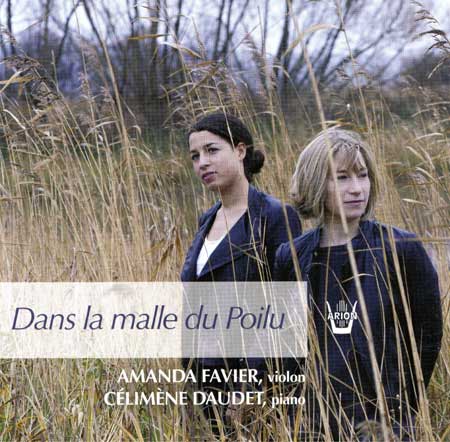
Dans la malle du Poilu, Amanda Favier (violon), Célimène Daudet (piano). Œuvres de Clara Schumann, Eugène Ysaÿe, Lili Boulanger, André Caplet & al. Arion 2013 (ARN 68828).
Enregistré en mars 2013 au studio 4'33'' à Ivry.
Ce curieux titre est celui d'un disque à histoire. Le Poilu est le nom du violoncelle fabriqué à partir du bois de caisses de munitions, que Maurice Maréchal jouait au front de la Grande Guerre, mais il s'agit ici de son ami le violoniste virtuose Lucien Durosoir simple soldat, chargé fin 1915 par le général Mengin de former un quatuor à cordes, auquel s'adjoindra entre autres André Caplet. Ils agrémentaient ainsi des soirées pour les officiers, les offices religieux et les loisirs de leurs camarades des tranchées.
C'est ainsi que Lucien Durosoir put faire construire par les sappeurs la caisse qui abritait ses partitions. Cette caisse et son contenu sont toujours conservés par la famille. Amanda Favier et Célimène Daudet y ont puisé le programme de ce disque. Elles y ont ajouté quelques œuvres de Lucien Durosoir, qui la paix revenue ne continua pas sa carrière de virtuose. Il s'isola dans village des Landes, et se consacra à la composition.
André Caplet
Rêverie (extrait)
Plage 7
1-3. Clara Schumann, 3 romances opus 22.
4. Eugène Ysaÿe, Rêve d'enfant, opus 14.
5-6. Lili Boulanger, Deux pièces (Nocturne ; Cortège).
7. André Caplet, Rêverie.
8-9. Eugène Cools, Deux pièces opus 91 (Pièsnia ; Pliaska).
10-11. Fernand de la Tombelle, Berceuse ; Petite Berceuse.
12. Gabriel Fauré, Berceuse.
13-16, Florent Schmitt, 4 pièces opus 25 (Lied ; Nocturne ; Sérénade ; Barcarolle).
17. Alfredo d'Ambrosio, Elégie opus 46.
18-22. Lucien Durosoir, Cinq Aquarelles (Bretagne ; Vision ; Ronde ; Berceuse ; Intermède).
Pons Lionel (direction), Lucien Durosoir, un compositeur moderne né romantique (Préface par Myriam Chimènes).
Maréchal Maurice & Durosoir Lucien, Deux musiciens dans la Grande Guerre (présentation par Luc Dorosoir ; préface par Jean-Pierre Guéno). Tallandier, Paris 2005.
Petites annonces musicales
Chanteuse de variété française et internationale cherche pianitse accompagnateur vers Perpignan
Quatuor vocal (Lyon) cherche ténor pour concerts prévus en 2013-2014
Revue de presse musicale
(France 3) Besançon : les 50 ans de l'orchestre philharmonique.
(France Info) Alan Menken, le compositeur de « La Belle et la Bête ».
(Le Temps d'Algérie) Arts de l'Ahaggar : la musique spirituelle du groupe « Tartit » subjugue le public du Fiataa.
À propos . Bulletin . ollaborations . ![]()
©musicologie.org 2013
| L | M | M | J | V | S | D |
| 1 | 2 | 3 | ||||
| 4 | 5 | 6 | 7 | 8 | 9 | 10 |
| 11 | 12 | 13 | 4 | 15 | 16 | |
| 18 | 19 | 20 | 21 | 22 | 23 | 24 |
| 25 | 26 | 27 | 28 | 29 | 30 |
musicologie.org
56 rue de la Fédération
F - 93100 Montreuil
06 06 61 73 41


